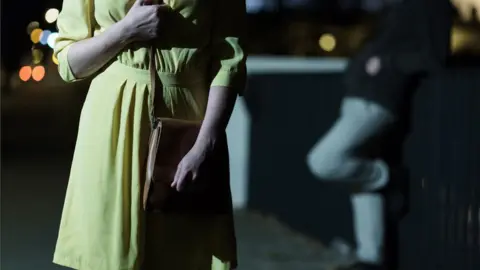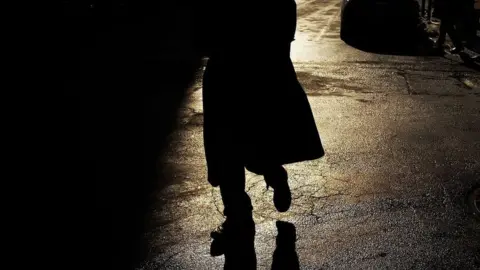Stalking: 'More understanding needed by police'
 iStock
iStockSome police officers are still not taking stalking seriously five years after it became a specific offence, a charity has said.
There were 305 recorded stalking crimes reported across Wales in 2016-17 - up from 138 in 2014-15.
Despite the rise, the National Stalking Helpline said some incidents were still being dealt with in isolation instead of being recognised as stalking.
UK police chiefs pledged improvements after a critical inspection.
Stalking became a specific offence on 25 November 2012.
Before that, anyone accused of stalking was prosecuted under harassment laws, but only when their actions were seen to cause a fear of violence.
The most common form of stalking reported to the National Stalking Helpline, run by the Suzy Lamplugh Trust, in the past two years was via social media sites, followed by text messages, phone calls and people being followed.
Fewer than 5% of victims said they had been physically harmed, had received deaths threats, been the victim of revenge porn or had been sexually assaulted as a result of stalking.
 Getty Images
Getty ImagesThe helpline's manager, Clare Elcombe Webber, said the rise in the reporting of stalking in Wales in recent years was a good thing because it showed more victims were coming forward.
But she said better police training was needed.
"Generally, front-line police officers don't receive much training on stalking, which means they often don't join the dots when a victim reports and identify what's going on as stalking," she said.
"We see a lot of stalking cases classed as harassment, or even dismissed entirely - and that's a huge problem because it can leave victims unprotected and stalkers unpunished.
"The majority of victims don't go to the police and say 'I'm being stalked', they talk about the behaviours - and that's why we need the police to be able to see the bigger picture of what's going on."

'Really frustrating'
 Getty Images
Getty ImagesJessica [not her real name] and her husband have been stalked by their neighbour for the past six years.
The man started watching and following them after she had her first child in 2011, but she said they struggled to get police to take them seriously because he has never made any physical contact.
"It's difficult trying to get them [police] to understand what it is that we're going through," she said.
"It's not your typical stalking behaviour - he's not sending me emails, phoning, there's never been a relationship with him, so it's not your usual case and I think that's where there's difficulty in recognising and understanding."
They report incidents to police most days and despite collecting evidence over five years the man was acquitted of stalking during a trial last year. But he was given a two-year restraining order.
Despite several breaches since, she said the couple still have difficulty reporting incidents because they rarely speak to the same officer.
She would like to see specialist officers assigned to cases so they know the background.
She said: "It's really frustrating. It's like trying to get blood out of a stone."

 PA
PAGwent Police Det Insp Leigh Holborn, of the force's public protection unit, said all officers were now trained to recognise stalking, harassment and controlling behaviour.
Practical sessions use real-life examples to help trainees spot the signs and they are also taught how to advise victims how to document evidence to be used in court.
He said all incidents were now logged on one central system to make it easier for any officer who comes into contact with a victim to be aware of previous reports.
He added: "What I do is urge officers to take as much detail as possible and to get victims to consent to share their details with our partner agencies, like Women's Aid.
"If we can get victims to engage then I feel more assured that there's going to be assistance... and they get more of a wrap around service of support."
